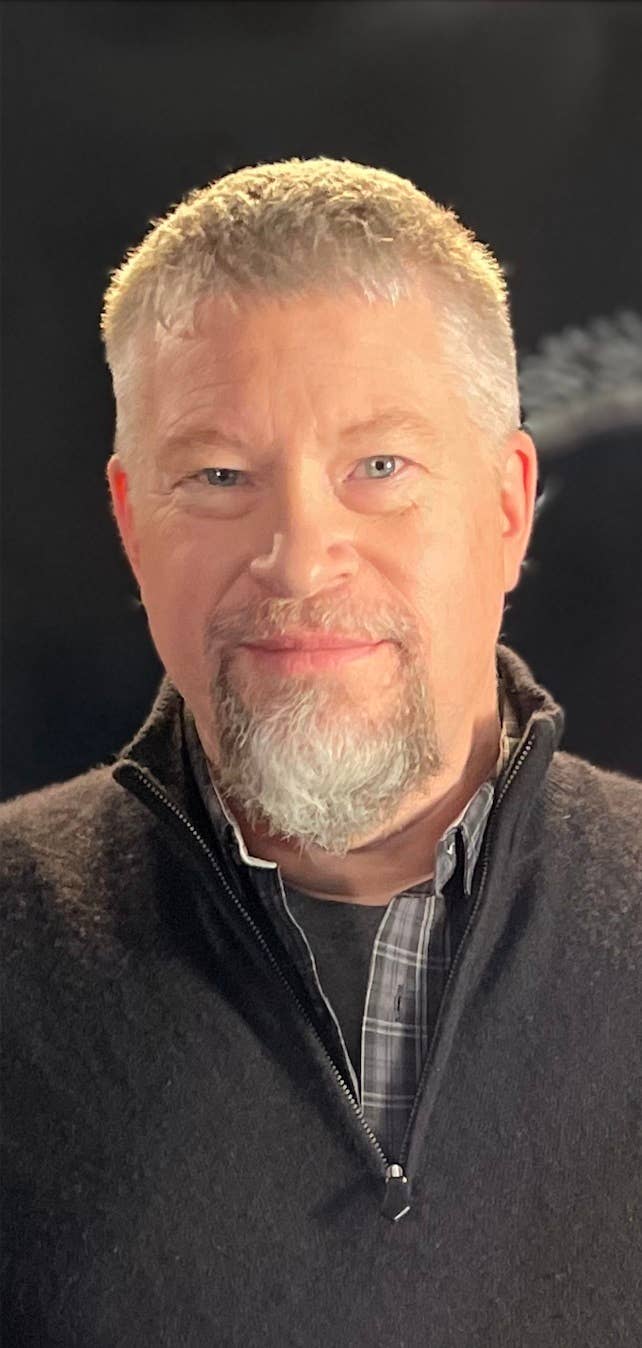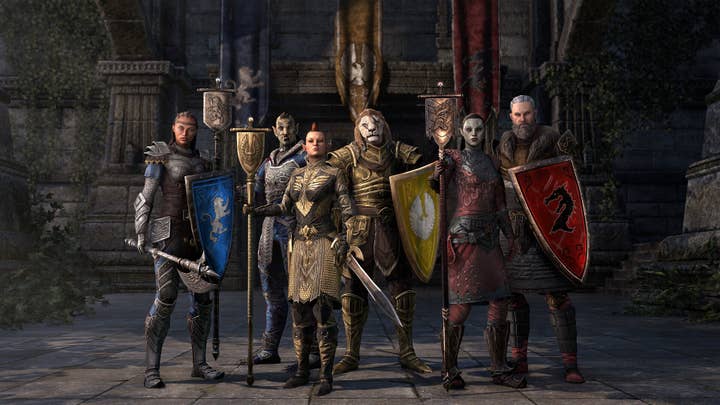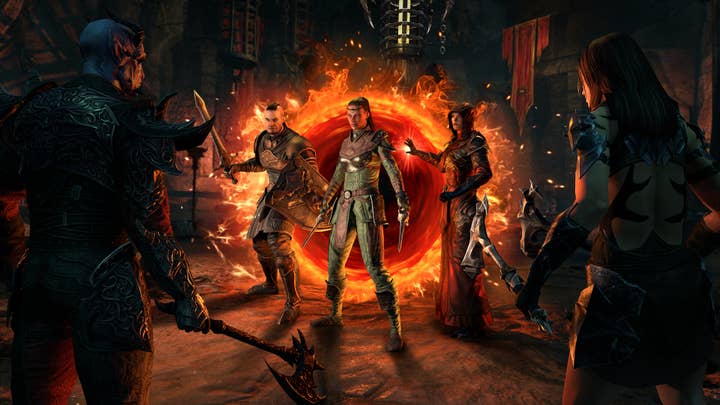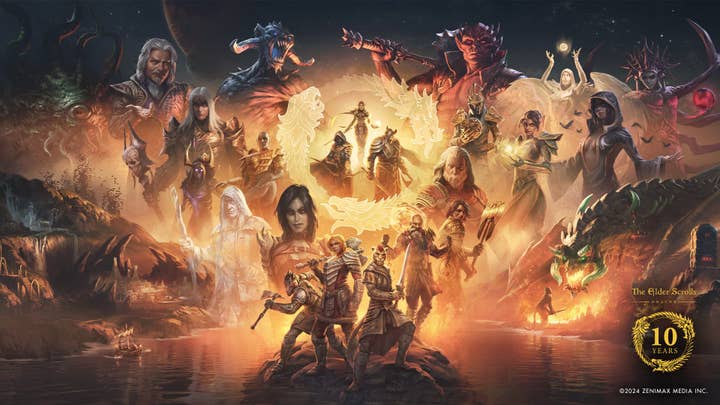A decade in Tamriel: Takeaways as Elder Scrolls Online turns ten
Creative director Matt Firor talks about MMOs, the metaverse trend, and what keeps him working on ESO 17 years after he started
Sign up for the GI Daily here to get the biggest news straight to your inbox
Last week, The Elder Scrolls Online turned ten years old. The game's creative director Matt Firor has been there from day one.
Even longer than that, actually. When the game's developer Zenimax Online Studios was first announced in 2007, Firor was the person put in charge.

When we speak with Firor at the Game Developers Conference, we ask him what keeps him interested in working on one title for that long a stretch, his answer comes readily. If nothing else, it's a question he's considered before.
"I think the fact that we're pretty much the current Elder Scrolls game plays a lot into it, because we have been kind of the flag carrier since 2014 for the whole IP," Firor says. "We work daily with Bethesda Game Studios so it's not like we're off on our own running in a crazy, chaotic direction, but we've introduced a lot of lore to the Elder Scrolls universe, and that obviously is something we love because it's such a beloved, established IP.
"But I think the simple answer to that question is we just love giving a home to people that want to play the game. We play the game too. It's a virtual world-ish type game, so during the pandemic we had lots of people just doing housing, doing low-key things to get away from the daily normal life. We were very much a safe harbor for a lot of people. Our numbers were crazy under COVID, we had our biggest numbers since we launched on console in 2020 and 2021. All of that goes together. We have a community that loves to play the game, and our job is to make sure we're good stewards for the world they're playing in."
Given the rest of the industry's struggles after the COVID bump faded, we ask about how the game is doing now, and Firor says the numbers have returned to the trajectory they had been on before the pandemic, which he's happy with.
"It's nothing out of the ordinary," he says. "We're still very successful. We just announced we're about to cross the $2 billion lifetime for the game, which is frankly amazing and a huge milestone. It's going great."
That's not to say the game's experiencing a hockey stick curve or even continuous growth.
"It's cyclical," Firor says. "Once you get to this point, there are times when the player base goes and plays other games, and there are times when they come back. And we designed ESO to be that way. We wanted to make ESO the easiest game to leave and come back to as possible.
"If you look at it with the chapter system, we launch a giant update every year. We actually have a cohort of players that comes in, plays the new chapter for two or three weeks, then goes away and doesn't come back until the next chapter launches. And it's totally fine… It's a testament to ESO that we have so many different types of gameplay that people who want to play hardcore can play hardcore, and people who want to play casually can play casually."

Firor says Elder Scrolls Online has done as well as it has not just because it's flexible about the time commitment it asks from players, but because it's flexible about what they can spend that time doing.
"I use the words 'virtual world' very much intentionally because you ask five different ESO players to describe the game they're playing and you'll often get five completely different answers. And we love that."
He adds, "I log in to ESO, and I can literally be a home decorator, and not do combat at all. I just get a flag on my character and people pay me to go literally design and decorate their houses. You don't think of ESO in that sense, but people totally play the game that way. We have a whole community of people that does nothing but high-end housing constructs, like statues and museum-looking things, and then publishes a video of it on YouTube. Also, people play hardcore PvP in ESO. And that's a virtual world to me."
In a lot of ways, it sounds like what we were promised by people pushing visions of a metaverse not too long ago, so we ask Firor if he saw those visions as anything fundamentally different from the experiences Firor has spent his career making like Elder Scrolls Online and Dark Age of Camelot before that.
"I've been waiting decades for someone to ask me that question," Firor says. "Absolutely you cannot have a metaverse without something to do inside the metaverse. That was last year's buzzword, right? This year it's all about AI and nobody's talking about the metaverse anymore.
"Metaverses, or what I prefer to call virtual worlds, need to be online communities. There's no reason why Reddit couldn't be considered one; it's a text-based virtual world. My earliest games were text-based, with no graphics at all, and they were very much virtual worlds where people got together, chatted, and had fun.
"I could do a whole TED talk on this, but I think the critical thing is that the metaverse talk from last year was very much a tech discussion, which is very big in Silicon Valley when you're looking for investment. But nobody will play a virtual world if there's nothing to do inside the virtual world, so it's really a content and systems discussion. The tech's been out there forever. Maybe AR goggles are new, but we've had the tech to display virtual worlds for decades now just on monitors, and that's where the magic is.
"We've been doing [connected worlds] for 20 years. It's not new, and they should stop treating it like it's new and get input from people who have been doing this a while."

When we speak, Firor is deliberate in using phrases like "virtual world" instead of MMO. He prefers to avoid the term because he sees it as too closely associated with a generation of MMOs like Dark Age of Camelot, Anarchy Online, and World of Warcraft.
Interestingly, that's also the model of MMO Firor said the development team originally had in mind when they started working on ESO, which Firor describes as maybe the biggest misstep they made.
"When we started ESO in 2007, Fallout 3 hadn't even launched then," Firor says. "Oblivion was only 18 months old. So our concept for what we were doing was very much rooted in 2004, 2005, and 2006 game concepts. And looking back on it, we should have been more forward thinking.
"When Skyrim launched, it changed everything. It's like, 'Oh my god, we feel way dated, no one's going to want to play this game.' And we had to pivot and make ESO more… I'm going to say 'Skyrim-like,' but what I really meant was to change it from a on-rails 2005 MMO to a virtual world. And we hadn't quite made the pivot yet when we launched, and we spent another two and a half or three years going down that road before [the October 2016 update] One Tamriel, which was the big update that changed everything. Then we were off and running."
While Firor might wish he had been more forward-thinking back then, he does give the early ESO team credit for knowing they wouldn't get everything right.
"What you can do is what we actually did very well, which is invest in the tools and the engine so you can make changes quickly when you need to make them," he says. "And that, we did very well. We were forward-thinking in that sense, and I think that's what saved us. That and the group decision to keep iterating until we got it right."
Ten years after launch and coming up on two decades since he started on ESO in the first place, that's one of Firor's key takeaways.
"Be flexible," he says. "Listen to your community. Your community is telling you what to do by their actions and their words. Take that data, take the data of what they're actually doing in the game, and keep your vision for what the game should be.
"Between those three data points, that's where you're going."
Sign up for the GI Daily here to get the biggest news straight to your inbox



